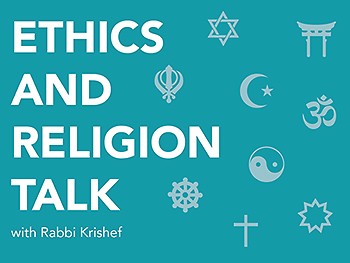The Ethics and Religion Talk panelists periodically reach out to their networks of coreligionists, congregants, and students to solicit questions for the column. Questions ought to be addressed to multiple faith traditions (i.e., questions about specific points of Christian theology or Jewish or Moslem practice are typically not suitable). The following question was submitted by one of Fred Stella’s students:
“There are many inter-religious conflicts around the world that don’t directly affect us here in the US, yet it’s easy to imagine that many Americans of various faiths have strong feelings about what their coreligionists are experiencing elsewhere. I’m curious if the panel members have to navigate these issues.”
Fred Stella, the Pracharak (Outreach Minister) for the West Michigan Hindu Temple, responds:
This is one of the most challenging issues facing those of us in the interfaith arena. In the case of Hinduism, we can look to the nation of India, the spiritual homeland of the Dharma. There are significant issues that will not be resolved between Hindus and both Muslims and Christians anytime soon. And it is quite clear that Americans tend to sympathize with the other faiths. Major media outlets here have failed terribly in providing correct context. Over the past few years I’ve done what I could to level the field a bit. And to do this while maintaining strong relationships with Muslims and Christians locally is of paramount importance. I serve as president of Interfaith Dialogue Association, an affiliate organization of Kaufman Interfaith Institute at Grand Valley State University. We are committed to keeping our focus narrowed on matters of religion, and eschewing politics, especially international situations. This is not always easy, as there are those who consistently attempt to pull us into those conversations that are beyond the scope of our mission.
Imam Kip Curnutt, Director of Religious Education and Associate Imam of Masjid At-Tawheed in Grand Rapids, responds:
As Muslims we believe in the concept of the Ummah, or the collective body of believers. The Prophet Muhammad, peace be upon him, likened the Ummah to one body such that when one part is in pain, the entire body is afflicted. Thus, we feel strongly when we see our fellow Muslims suffering around the world. I believe this is a very positive sense of communal responsibility and it is no doubt a sentiment reflected in other religious communities. For Muslims living in the West, the challenge is to make sure that we don't assign collective guilt to innocent people because of the suffering of our brothers and sisters. For example, if a certain country's foreign policy decision causes suffering in the Muslim world, that doesn't mean that we can blame everyone in that country. Particularly as Muslims in America, we have a great opportunity to educate our fellow citizens about the suffering of our fellow Muslims around the world and the way that our government's foreign policy decisions at times plays a large role in that suffering so that we can bring about change in a positive way.
Linda Knieriemen, Senior Pastor at First Presbyterian Church in Holland, responds:
Our church family hosted a pastor from Egypt some years ago, a country in which practicing churches are in the minority and in which Christians are harassed, persecuted and discriminated against in employment and housing. It was educational for those of us who, living in a majority Christian culture do not generally suffer because of our religious beliefs. While my parishioners have been aware of Christians living in at-risk situations, are appalled that such discrimination exists, and hear prayers for those who suffer for their faith, persecution of Christians has not taken a high profile place in their lives or the lives of the church as a whole.
My response:
The Jewish world is highly connected through a system of organizations connected to the Joint Distribution Committee, the Jewish Agency for Israel, and the Jewish Federations of North America. We have an ethical imperative both to support our internal extended “family” of Jews, locally and around the world, and to support our local community of all people among whom we live. We also feel a call to support communities of people of any religion or ethnicity who are suffering from poverty, war, or natural disaster.
It is not always easy to determine priority of need, but typically, local Jewish concerns come first, followed by Israel and world Jewish needs, followed by local needs and secular causes. The alphabet soup of Jewish organizations around the world speaks to virtually every need across the political spectrum, from antisemitism to zenophobia. We are proud that the State of Israel is always among the first to respond to international humanitarian refugee needs or disasters of any kind, and the Jewish Federations of North America and its affiliated organizations are quick to step to the plate with financial assistance as well.
This column answers questions of Ethics and Religion by submitting them to a multi-faith panel of spiritual leaders in the Grand Rapids area. We’d love to hear about the ordinary ethical questions that come up in the course of your day as well as any questions of religion that you’ve wondered about. Tell us how you resolved an ethical dilemma and see how members of the Ethics and Religion Talk panel would have handled the same situation. Please send your questions to [email protected].
The Rapidian, a program of the 501(c)3 nonprofit Community Media Center, relies on the community’s support to help cover the cost of training reporters and publishing content.
We need your help.
If each of our readers and content creators who values this community platform help support its creation and maintenance, The Rapidian can continue to educate and facilitate a conversation around issues for years to come.
Please support The Rapidian and make a contribution today.
